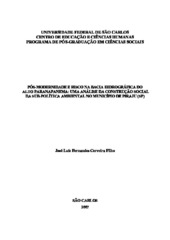| dc.contributor.author | Cerveira Filho, José Luiz Fernandes | |
| dc.date.accessioned | 2016-06-02T19:24:43Z | |
| dc.date.available | 2007-10-29 | |
| dc.date.available | 2016-06-02T19:24:43Z | |
| dc.date.issued | 2007-08-31 | |
| dc.identifier.citation | CERVEIRA FILHO, José Luiz Fernandes. Pós-modernidade e risco na bacia hidrográfica do Alto Paranapanema : uma análise da construção social da sub-política ambiental no município de Piraju (SP).. 2007. 353 f. Tese (Doutorado em Ciências Humanas) - Universidade Federal de São Carlos, São Carlos, 2007. | por |
| dc.identifier.uri | https://repositorio.ufscar.br/handle/ufscar/1398 | |
| dc.description.abstract | During the twenty century the hydroelectric industry was responsible for the most
offers of energy in Brazil. However, recently hás been sharpen with one the biggest
responsible for the environmental degradation enlargement. After diverses conspicuousness
about environmental damages, the society began to reflect in more deeply way about there
future and there mecanisms of technical development. The misfortunes systematic harvest
in the environmental field brings the real possibility of social interference, by new
institutions, as well others not so new, but reformulated, like some legal institutes of long
tradition. If, in one hand, the legal institutional acknologment that suchlike activity
degrades the environmental not guarantee that quelly measures can be catched, in the other
hand, contributes expressively towards the development and the legitimation of new morals
patthers of sociability. Is the moment that we qualify the pos modernity, when emerges the
favourable conditions in order to social action, mainly in local level, where perceives and
manages in concrete way the impremeditated consequences of the energy matrix
development. The general objective of this study was apprehend what were the motivations
for the municipality of Piraju (SP) elaborated and aproved one ensemble of restrictives
measures to new hydroeletric activity. Specifically seeks to comprehend how the process of
social construction of this reflective mark happens, and how the study of this construcionist
process can corroborate with some comtemporary social theory. Secundarly tried to
comprise the career of local environmental moviment and whereby variant of this interest,
how some questions considers pos moderns collaborates for the local desconstruction by
the developmentism of the hydoreletric sector. | eng |
| dc.format | application/pdf | por |
| dc.language | por | por |
| dc.publisher | Universidade Federal de São Carlos | por |
| dc.rights | Acesso Aberto | por |
| dc.subject | Sociologia ambiental | por |
| dc.subject | Pós-modernidade | por |
| dc.subject | Paranapanema | por |
| dc.subject | Rio, Bacia (SP e PR) | por |
| dc.subject | Piraju (SP) | por |
| dc.subject | Usinas hidrelétricas | por |
| dc.subject | Environmental sociology | eng |
| dc.subject | Pós-modernity | eng |
| dc.subject | Risk | eng |
| dc.subject | Hydroelectric | eng |
| dc.subject | Piraju | eng |
| dc.subject | Paranapanema river | eng |
| dc.title | Pós-modernidade e risco na bacia hidrográfica do Alto Paranapanema: uma análise da construção social da sub-política ambiental no município de Piraju (SP) | por |
| dc.type | Tese | por |
| dc.contributor.advisor1 | Vargas, Marcelo Coutinho | |
| dc.contributor.advisor1Lattes | http://genos.cnpq.br:12010/dwlattes/owa/prc_imp_cv_int?f_cod=K4787342P0 | por |
| dc.description.resumo | Durante o século vinte a indústria hidroelétrica foi responsável pela maior parte da
oferta de energia no Brasil. Contudo, mais recentemente tem sido apontada como uma dos
grandes responsáveis pela ampliação da degradação ambiental. A partir de diversas
evidências sobre danos ambientais, a sociedade passou a refletir de maneira mais
aprofundada sobre o seu futuro e sobre os seus mecanismos de desenvolvimento técnico. A
colheita sistemática de infortúnios no campo ambiental trouxe uma possibilidade real de
interferência social, através de novas instituições, bem como de outras nem tão novas, mas
reformuladas, como certos institutos jurídicos de longa tradição. Se, por um lado, o
reconhecimento institucional legal que tais atividades degradam o meio ambiente não
garante que medidas serão tomadas, por outro, contribuem em larga medida para o
desenvolvimento e a legitimação de novos padrões morais de sociabilidade. É em momento
que qualificamos de pós-modernidade, quando surgem as condições propícias para atuação
social, principalmente no âmbito local, onde se percebem e se administram de modo
concreto as conseqüências impremeditadas do desenvolvimento da matriz energética. O
objetivo geral desse estudo foi o de apreender quais foram as motivações para que o
município de Piraju (SP) elaborasse e aprovasse um conjunto de medidas restritivas às
atividades hidroelétricas. Especificamente buscou-se compreender como se deu o processo
de construção social desse marco reflexivo, e em que medida o estudo desse processo
construcionista pode corroborar com algumas teorias sociais contemporâneas.
Secundariamente procurou-se compreender a trajetória do movimento ambientalista local e,
como variante desse interesse, como alguns questionamentos considerados pós-modernos
colaboraram para a desconstrução local do desenvolvimentismo no campo da
hidroeletricidade. | por |
| dc.publisher.country | BR | por |
| dc.publisher.initials | UFSCar | por |
| dc.publisher.program | Programa de Pós-Graduação em Ciências Sociais - PPGCSo | por |
| dc.subject.cnpq | CIENCIAS HUMANAS::SOCIOLOGIA | por |
| dc.contributor.authorlattes | http://lattes.cnpq.br/0243387443214953 | por |
